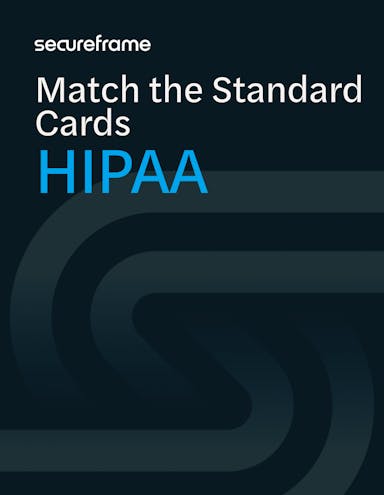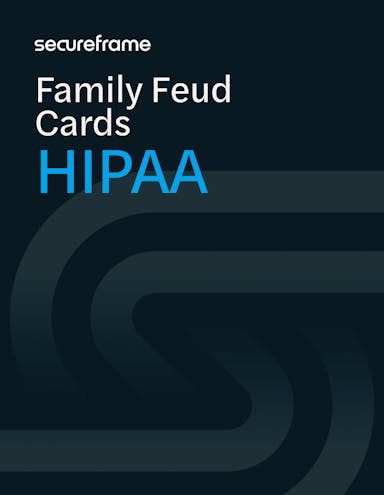
5 Fun HIPAA Training Games Your Employees Will Remember
Emily Bonnie
Senior Content Marketing Manager
Jonathan Leach
Senior Manager, Compliance and Customer Success
If your organization handles protected health information (PHI), do you recall what your HIPAA compliance training was like?
For many people, training involves sitting through a boring slideshow presentation. Considering the potential consequences of committing a HIPAA violation — where a single moment of forgetfulness could cost you a $25,000 fine — HIPAA compliance should be taught in a memorable way.
Fortunately, fun HIPAA training games offer that solution.
Read on to learn how to get your team on the same page with HIPAA compliance.
Who needs to comply with HIPAA?
Under HIPAA, any organization that handles a person’s medical information is responsible for keeping that information confidential.
This includes all covered entities (healthcare providers, health plans, and healthcare clearinghouses) and their business associates.
Why is HIPAA training important?
Training employees on HIPAA requirements and best practices is mandatory for compliance.
In the event of a HIPAA violation, employers could be subject to fines of up to $1.5 million if the Department of Health & Human Services Office for Civil Rights (OCR) finds that they’ve failed to adequately train employees on HIPAA best practices.
Setting aside that compliance training is legally required, it’s also financially prudent. Compliance statistics show that organizations spend $5.47 million on compliance compared to an average of $14.82 million for non-compliance.
HIPAA compliance is high stakes, so memorable training is crucial. These are the major provisions that HIPAA training should cover.
What is HIPAA training?
A HIPAA training program should ensure that all employees storing, handling, accessing, or sharing PHI are familiar with the major provisions of HIPAA. These include the Privacy, Security, and Breach Notification Rules, which we’ll explain in detail below.
Employees should be taught how to follow the organization’s privacy and security policies during their onboarding process and on a regular basis.
This type of employee training is considered an administrative safeguard under the HIPAA Security Rule. Healthcare organizations have to have certain administrative safeguards, like employee training, as well as physical and technical safeguards in place to protect patient data against breaches to achieve HIPAA compliance.
Overview: HIPAA rules

HIPAA became law in 1996 with the goal of improving the efficiency and effectiveness of the U.S. health care system. Lawmakers soon recognized that electronic technology required modern provisions to protect people’s health information.
As a result, HIPAA now includes the Privacy, Security, and Breach Notification Rules.
Here’s a quick overview of each rule.
Privacy Rule
The Privacy Rule sets standards for protecting individuals' medical records and PHI. Organizations that handle an individual’s health information must provide reasonable protections and restrict who can look at and receive PHI.
This rule sets limits so that organizations may only use or disclose PHI for treatment, payment, or health care operations purposes.
The rule also gives individuals rights to obtain copies of their health records and to authorize third-party transfers involving their PHI.
Security Rule
The Security Rule requires organizations to maintain administrative, technical, and physical safeguards to protect electronic PHI (ePHI).
In practice, they must:
- Conduct risk analyses to identify and protect against internal or outside threats to ePHI
- Protect against impermissible uses or disclosures of ePHI
- Ensure workforce compliance with privacy and security standards
Breach Notification Rule
The Breach Notification Rule requires HIPAA-covered entities to notify any affected individuals within 60 days of discovering a breach of unsecured PHI.
In breaches involving more than 500 people, organizations are also required to notify the OCR within their state in the same 60-day timeframe.
To help members of your organization follow these rules, use our HIPAA training games below.
5 fun HIPAA training games
Managing and protecting health information is a major responsibility. It’s essential that employees know how to spot HIPAA violations and what to do if they occur — and that the information sticks long after the training is over.
Fun confidentiality training activities in tandem with traditional training can help drive knowledge retention.
Here are a few HIPAA games to try out for a memorable team experience.
Game 1: Whose HIPAA Fine Is It Anyway?
Role-playing can teach employees how to identify HIPAA violation examples in an engaging way.
For a bit of HIPAA humor, try this game inspired by the comedic improvisation show “Whose Line Is It Anyway?”:
- Pick a few volunteers.
- Provide a HIPAA scenario to enact in front of the training group. Include a potential violation such as: “You tweeted a screenshot of a celebrity’s medical records.”
- Next, give the group a chance to enact the potential remediation. For example: “We need to inform the affected individual.”
At the end of the performance, ask the group:
- Which HIPAA rules were ignored?
- What could the possible fines be?
Game 2: Match the HIPAA Standard
Each HIPAA provision contains a series of standards. For example, the Privacy Rule contains the Minimum Necessary standard, which requires covered entities to use as little PHI as possible to accomplish a given treatment, payment, or health care operation task.
This memory-like game will challenge your team to match the standard cards with their definition.
- Write down HIPAA standards on individual cards. Label the back of each card “Standard.”.
- Write down the definition of each standard on separate cards. Label the back of each card “Definition.”
- Split your training group into two teams.
- Shuffle the cards and deal an equal number of standards and their definition cards face down to each team.
- Each player turns over one standard card and one definition card.
- Individuals will take turns trying to match a standard card with the right definition card to earn a point for their team.
- If someone makes an incorrect match, they must flip the cards back over, and their turn ends.
- The first team to earn 10 points wins.
You can also use these printable Match the HIPAA Standard cards to create your own standards and definitions. If you need inspiration, the OCR offers a helpful summary of HIPAA rules and regulations.


Match the HIPAA Standard Cards
As part of your HIPAA training program, use this memory-like game to challenge your team to match the standard cards with their definition. Download these printable cards to get started.
Game 3: HIPAA Family Feud
Adding competitive game show components to your training should also help keep your employees engaged.
Here’s a fun way to test your employees’ HIPAA knowledge:
- Divide the group into two teams.
- Ask a trivia question related to HIPAA.
- Give each group time to convene about the correct answer. For example: “When was HIPAA enacted?”
- Have each team write down their answer for an opportunity to earn a point reward.
- If they're right they get a point, but if they're wrong the other team gets a chance to steal the point by answering correctly.
- Whichever team accumulates the most points wins.
Use these printable HIPAA Family Feud cards to enhance the gameplay experience and quiz your team members.


Download printable HIPAA Family Feud Cards
As part of your HIPAA training program, incorporate a competitive game like Family Feud to test your employee's knowledge in a fun and memorable way. Download these printable cards to get started.
Game 4: HIPAA Jeopardy!
Fun HIPAA training would not be complete without a “Jeopardy!”-inspired game.
First, list six different HIPAA-oriented categories in a slideshow presentation, like this:

The questions with lower values should be the easiest to answer. The highest value questions should be the hardest.
- Divide your employees into teams and let them pick questions.
- Once they’ve selected a category and value, reveal the question.
- The first team to raise their hands will then answer the question. If correct, they are awarded the value associated with the question. If incorrect, the team loses the value.
- The team with the most “money” at the end wins.
Game 5: Beyond HIPAA Belief: Fact or Fiction?
Some real-life HIPAA violation cases seem too outlandish to be true. Inspired by the show “Beyond Belief: Fact or Fiction?”, this training game tests out your team’s knowledge of HIPAA history.
You shouldn’t expect them to know every historical HIPAA case, but this is a fun way to teach about HIPAA violations and repercussions.
- Prepare in advance a few examples of disastrous HIPAA violations. Pick some based on real events — the more disastrous, the better! — and make some up.
- Gather your training group and present each case. Each case should detail: what happened, the HIPAA violations, and the penalties.
- At the end of each case, ask the group members to vote if the case is real or fake.
- Let the group know which cases were fact or fiction, and see who was able to guess the most correct answers.
When combined with traditional training, these fun HIPAA training games should help your employees avoid common office violations. Be sure to provide these training sessions annually to keep your team sharp.
Comprehensive training is a great way to build a HIPAA-compliant culture, but organizations can’t afford to be complacent.
Luckily, you can streamline your HIPAA compliance efforts with Secureframe. In addition to offering comprehensive HIPAA training, Secureframe automates the assignment, reminders, tracking, and reporting of security. We can also help you create HIPAA privacy and security policies, train employees on how to protect PHI, manage vendors and business associates, and monitor your PHI safeguards. By eliminating a significant amount of these manual tasks, Secureframe helps save organizations hundreds of hours and thousands of dollars on policy creation, external security training, consultant fees, and more.
For example, Echo IQ saved $120K in compliance costs and achieved SOC 2 and HIPAA compliance in six months with Secureframe. This helped them launch successfully in the US market and present a really strong security story to customers across the globe.
Get in touch to learn how our platform and team of experts can save you time and protect you from potential HIPAA violation fines.
FAQs
What is the primary purpose of HIPAA training?
By providing guidance on handling PHI, identifying potential risks, and preventing violations, HIPAA training is designed to help employees understand the requirements and responsibilities for protecting patient health information and help organizations stay compliant with HIPAA regulations and avoid costly fines.
How often should HIPAA training be conducted?
HIPAA training should be conducted during onboarding and at least annually.Regular refreshers are crucial to address any updates in regulations and reinforce best practices. Consistent training also helps maintain a culture of compliance and keeps staff informed about the latest requirements.
What should HIPAA training include?
Training should cover the Privacy, Security, and Breach Notification Rules, as well as organization-specific policies for handling PHI and responding to potential breaches.
Who needs to receive HIPAA training?
All employees who handle, access, store, or share PHI must complete HIPAA training, including contractors and business associates.
Can games replace traditional HIPAA training?
Games should supplement traditional HIPAA training, not replace it. They’re effective for reinforcing knowledge and improving retention.
What are the penalties for non-compliance with HIPAA training requirements?
Organizations that fail to train employees adequately may face fines of up to $1.5 million annually per violation.

Emily Bonnie
Senior Content Marketing Manager
Emily Bonnie is a seasoned digital marketing strategist with over ten years of experience creating content that attracts, engages, and converts for leading SaaS companies. At Secureframe, she helps demystify complex governance, risk, and compliance (GRC) topics, turning technical frameworks and regulations into accessible, actionable guidance. Her work aims to empower organizations of all sizes to strengthen their security posture, streamline compliance, and build lasting trust with customers.

Jonathan Leach
Senior Manager, Compliance and Customer Success
Jonathan Leach is a cybersecurity and compliance expert with over a decade of experience spanning information security, GRC, IT risk management, and cloud security. Prior to joining Secureframe, he led compliance programs and audit readiness efforts for both Fortune 500 enterprises and high-growth startups. His background includes deep expertise in international frameworks such as ISO 27001, ISO 27701, and GDPR, as well as HIPAA and HITRUST. At Secureframe, Jonathan helps companies build scalable, audit-ready compliance programs from the ground up.